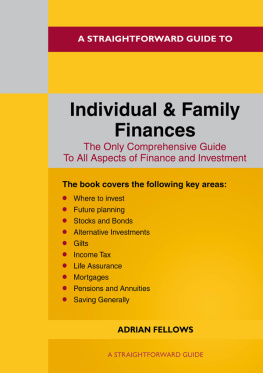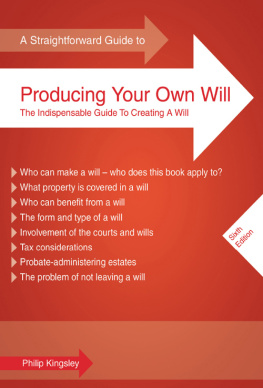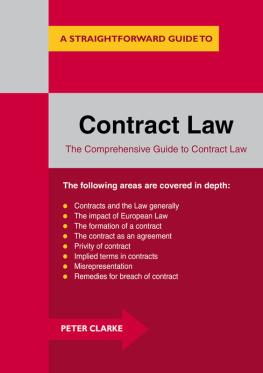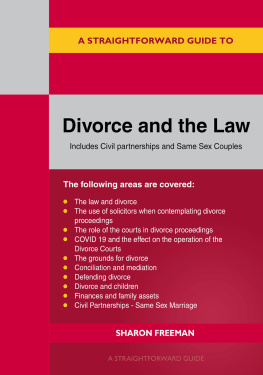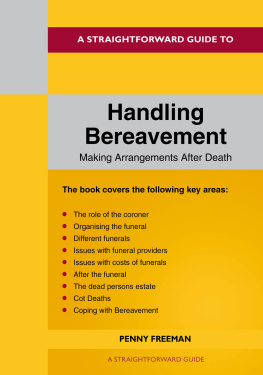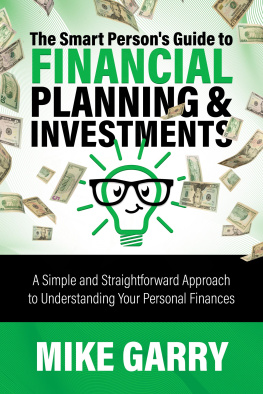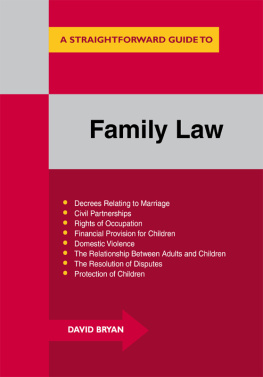Contents
Guide
A STRAIGHTFORWARD
GUIDE
TO
INDIVIDUAL AND FAMILY
FINANCES
Adrian Fellows
Editor Roger Sproston
Straightforward Guides
www.straightforwardco.co.uk
Straightforward Guides
Straightforward Co Ltd 2020
All rights reserved. No part of this publication may be reproduced in a retrieval system or transmitted by any means, electronic or mechanical, photocopying or otherwise, without the prior permission of the copyright holders.
ISBN: 978-1-913342-56-2
ePUB ISBN: 978-1-913776-53-4
Kindle ISBN: 978-1-913776-62-6
Printed by 4Edge Ltd www.4edge.co.uk
Cover design by BW Studio Derby
Whilst every effort has been made to ensure that the information contained within this book is correct at the time of going to press, the author and publisher can take no responsibility for the errors or omissions contained within.
CONTENTS
***
INTRODUCTION
The main purpose of this book, updated to 2020 is to guide the reader through the maze of personal financial decisions which he or she or the family might have to make during a lifetime. Currently, we are in a period where the COVID 19 pandemic is dominating our lives and playing havoc with the economy. Peoples incomes are being affected and returns on investments (for the most part), have been decimated. Savings rates have dropped right down and there is even talk of negative interest rates. That is why it is now so important to understand the opportunities available.
In addition, Britains exit from the European Union may well affect different parts of the financial landscape. This is a case of wait and see.
I have concentrated heavily on specific areas such as pensions, savings and insurance, because these are areas which have been affected the most and which will have the most effect on you during the course of your working life. The book also discusses the operations of the stock market and how to invest wisely. There are also frequent references to financial advisors, ranging from the independent advisor to those employed by institutions such as banks. I have made repeated references because very often you will receive advice from such a person and will make decisions based on that advice. It is very important indeed to know exactly who you are receiving advice from.
As an individual, you could spend untold hours considering the various options open to you with regard to financial matters, only to find yourself more confused than ever due to conflicting advice received along the way. That advice will, quite often, be made in the best interests of the advisor, and his or her subsequent commissions, rather than in the best interests of yourself.
A Guide to Individual and Family Finances will set out, in a clear and unambiguous way, the meaning and implications of the various financial options open to you, and should leave you in a better position to make an informed choice.
The main areas covered by the book are mortgages, life insurance, savings generally, investments, income protection, stocks and shares, tax wills and trusts and pensions. In addition, I have also covered education, and health care plus wedding and funeral plans. Because of the importance of receiving accurate advice from financial advisors, the book will begin by outlining the law that governs such advisors and also the types of advice given.
**
Ch. 1
Financial Advice/Financial Advisors
There are many ways to purchase financial products nowadays, either through the Internet or by telephone. However, when considering more complex financial issues, it is evident that professional advice is needed. There are numerous advantages to using financial advisors, one of the main ones being that you will have extra protection if things go wrong. The first step towards finding a good advisor is considering which type is likely to provide the service you need. Like solicitors and other professionals, financial advisors do specialise and you would have to find the correct advisor for your needs. It is also very important to discover whether or not the advisor is properly authorised and registered and approved by the correct bodies. Nowadays, advisors and the companies that they work for must be authorised by the financial services watchdog, the Financial Conduct Authority (FCA). The FCA is responsible for the conduct of advisors. To be on the safe side you should always check with the FCA. You can also find out what type of business the advisor is authorised to do. These details are held on the FCAs register. Its public enquiries helpline is on 0800 111 6768. It is important to be aware of the distinctions between different types of advisors, the services they are likely to provide, and how they are likely to be paid, before narrowing your choice down.
Different types of investment advisers
Financial advisers come in different guises and arent always called financial advisers. Sometimes they are named by their specialism such as mortgage adviser, investment adviser, pension adviser or financial planner. Sometimes they are known as brokers - often when dealing with products like home and car insurance, mortgages or investments like shares.
Advisers who deal with: Investments; pensions; retirement income products (such as annuities) and general financial planning
Since January 2013, advisers recommending these types of products must charge a fee for the advice they give and carry higher levels of qualifications. Prior to this, many were paid by commission collected from charges on the products they sold.
In reality, advisers who provide advice on the products listed above, might also provide advice on protection insurance (such as life insurance) and sometimes mortgages. Many offer holistic financial planning, where they will advise you on all aspects of your financial needs. Advisers in this category are classified as either independent or restricted.
Independent financial advisers can recommend all types of retail investment products from firms across the market. Restricted advisers might either be restricted in the type of products they offer, or the number of providers they choose from. Make sure you understand the type of service they offer before you decide whether to get advice from them. You should choose an adviser who can deal with a wide range of product providers for the product they are recommending and not just one or two. That way you know you will be getting the widest choice.
Advisers who deal with: Mortgages and equity release
Mortgage advisers must have specific mortgage qualifications. Advisers recommending equity release products must also have a specialist qualification in equity release. These advisers are still permitted to be paid by commission on any mortgage or equity release product they sell. Some mortgage advisers also charge a fee for their services. Many mortgage advisers can also advise on protection insurance such as life insurance.
Mortgages advisers might offer a whole of market service, although this wont necessarily mean they can recommend any mortgage from every lender as some lenders only offer mortgages direct to the public. Some mortgage advisers are tied to just one lender or might only be able to choose from a small number. So an adviser who offers a whole of market service will give you the widest choice.
Advisers who deal with: General insurance products (such as home, car and travel insurance)

